Apple should allow you to sync all iOS settings between two iOS devices, including the apps and their order on home screens.
Category: Tech
Could iPhone 8 Have Flexible Screen Sides?
Update - April 20th, 2017
We have more rumors and real analyst articles which show that my idea of the iPhone 8 having a flexible screen wrap around the sides isn't likely at all. Not surprising of course, and the first rumor to really disprove my crazy theory came just a few days after I wrote this article. For people who are interested in finding out what features will be in the "iPhone 8", don't bother reading this article. For people interested in hardware design or possible form factors for future iPhones or other mobile phones, you might still be interested in reading this. I talk about how future phones and mobile devices could have flexible screens that wrap around the side, as well as a couple of the uses this design would have.
- Apple's 'iPhone 8' to replace Touch ID home button with 'function area,' start at $1,000 - Feb 15, 2017
- Alleged 'iPhone 8' diagrams show display dimensions, sensor array - Apr 17, 2017
Original Article
First of all, to get up to speed on some of the possible rumors, here is a quick overview by AppleInsider, which they have been using in their articles about the next big redesign of the iPhone. For instance, this quick overview is included in their last rumor I read today, Apple's 'iPhone 8' again rumored to feature reinforced glass back, stainless steel frame
- Sept. 2017 launch
- Screen sized 5.1"-5.2"
- Edge-to-edge OLED
- Curved glass back, screen
- Dual-lens camera
- 10nm "A11" processor
- Wireless charging
- Touch ID, FaceTime camera, speaker embedded in screen
AppleInsider and many others have also noted various times about 5.8" OLEDs being produced for the next iPhone. And that maybe the actual size of the screen will end up being a usable 5.1" even though the OLED screens being manufactured are 5.8" in size. One possibility might be that they are getting larger sized screens produced, but they will be cut down to a lower 5.1"-5.2". Another is that with a rounded screen, extra length is added to the actual screen size, 5.8", to make the usable screen size appear over a smaller real life dimension, 5.1". A third option would be that there will eventually be two different sizes, both a 5.1-5.2" device, and later or the following year a Plus sized 5.8-5.9" device.
However, one guess that I have is for something a bit different, which I don't think has been noted or suggested in most of the rumors.
A "Screen" On Each Side Of The Phone
I wonder if the reason for the discrepancy in screen sizes to date could be because of a new "feature" for this all new design. I think the usable and visible size on the front of the screen could be about 5.1", but that the actual screen continues and wraps around each side of the iPhone. And we would be able to touch each side of the device to provide other types of input, such as scrolling up and down without touching the front of the screen.
Meaning, the "screen" we see is just 5.1", but an "invisible" screen wraps around the sides.
Likely the OLED display would wrap around just the left and right side, not the top and bottom. Even if the screen wraps around the edge, it might not mean that we see an interface or image on the sides of the device either. Meaning, the "screen" we see is just 5.1", but an "invisible" screen wraps around the sides. And we can touch the sides of the device and it can respond in different ways. Though it could also provide an image possibly, for instance in what could appear as different "buttons" on different parts of the screen side.
Oh yeah, and when I say I "think" this could happen, I might actually mean "hope". Because I think it could be a good idea to allow the sides of digital devices to be touched for input by users. I think it would be a good design, and potentially be a very useful and intuitive interface option. What I mean, is I'm just guessing here everyone. I definitely don't have an inside track to what is actually going on. I have no idea what is going on, unlike people like writer John Gruber of Daring Fireball, or Apple analyst Ming-Chi Kuo.
Why Would A "Side-Screen" Be Useful?
So why would this all new design have a screen that wraps around the side? What could you do with this extra design feature? Since it could allow touch input, pretty much anything. As I mentioned, I think the most obvious use is for scrolling up and down by using your thumb on the side of the device.
You would just touch your finger along the side of the device to scroll through and select items on the screen.
Other options for the side screen could include "buttons" on the side of the device. Maybe from the front you just see skinny rectangles about a centimeter high along the edge, possibly even in different colors. And touching the side of the device clicks that "button". Having pressure sensitive force touch options using the side of the device makes sense too. Anyway, the options are numerous, and I think the most obvious use is for vertical scrolling or scrolling through options on the screen without having your finger or thumb covering the front of the screen.
By the way, I think a screen extending to the sides of a device could eventually be used in something like the Apple Watch possibly too. You could potentially remove the digital crown, a moving part. You would just touch your finger along the side of the device to scroll through and select items on the screen. So if this touchable side screen idea is something that works out, I would expect to see it in many more devices in the future by Apple and others.
What Size Will The Screen Be?
The rumors now seem to be pointing to a usable screen size of 5.1-5.2" for the iPhone 8. And that the actual screen being produced might be about 5.8". So above I've been discussing how that rumor might apply to a new iPhone with a screen that wraps around the edges. However I'll add that I think it could be possible that another option for the iPhone 8 is that it's usable size will remain at 4.7". Exactly the same size as the iPhone 6 and 7. And that those extra 0.4-0.5 inches in the 5.1" OLED panel could be used to wrap around the sides of the device.
There are a couple reasons why I wonder if the iPhone 8 will come in the smaller 4.7" screen size. First off, it seems like there was a lot more rumors about OLEDs of the larger 5.8-6.0" size much earlier, but not as much lately. It seems like the 5.1-5.2" OLED panel size has been in the rumors more lately. I wonder if those larger sizes were testing for the current 5.5" Plus iPhone. And these newer rumors of the 5.1" OLED panels are testing and production for the current 4.7" iPhone.
More importantly though, I think Apple could potentially stick with a 4.7" usable screen size for the iPhone 8 to keep the resolution the exact same as the iPhone 6 and 7, at 1334x750, with the PPI at 326.
Then in the end Apple could have decided to start producing their first OLED iPhone in only one size, the smaller 4.7" size. Reasons for this decision could include that they don't know if they can meet demand by going all in with OLED in the first year. They want to still at least introduce their new design for the iPhone 10th anniversary. And they will still have a new 7S Plus released at the same time. So basically, they may have decided to not put all their eggs in one basket by only having a new iPhone 8 and 8 Plus with the new design, OLED display, and other technology. So they could be releasing an iPhone 7S and 7S Plus, along with the iPhone 8.
More importantly though, I think Apple could potentially stick with a 4.7" usable screen size for the iPhone 8 to keep the resolution the exact same as the iPhone 6 and 7, at 1334x750, with the PPI at 326. And that the rumors of the 5.1" screens being produced will wrap around the edges of the smaller iPhone's usable 4.7" screen. Reason being, they can't make the usable screen size bigger, going from 4.7" to 5.1", without keeping their magical 326 PPI retina display.
So they'd have to use the 1920x1080 HD resolution from the 5.5" iPhone Plus or come up with a new resolution, such as 2560x1440 for a 5.1" iPhone. That is definitely a possibility, but would require another resolution form factor. So I think it's also possible that they may be happy with the current resolutions and usable screen sizes. Resulting in them keeping the one-handed 4.7" 1334x750 screen for the regular iPhone 8 in 2017, and the larger 5.5" 1920x1080 screen for the iPhone 8 Plus version in 2018, the following year.
Conclusion
So to recap, I have two possible predictions that are bit contrary to the rumors that I have been reading about for the next big iPhone redesign, the potential iPhone 8. I think that contrary to reports, the screen size of the iPhone could stay the same at a usable 4.7", even though the OLEDs produced have an actual size of 5.1-5.2". Then, the next year, an iPhone 8S Plus version could be produced with a usable screen size of 5.5", with an actual OLED panel size of 5.8-6.0".
Secondly, I wonder if that extra bit of screen panel is used to curve and wrap around the left and right sides of the device. That the side of the device will be used as a touch screen for input, effectively replacing buttons on the side and offering more options for input. This user input on the side of the device will change depending on the application. It could take the form of scrolling, to selecting elements, to clicking soft buttons, or anything else. And I think it would be a great idea and a potentially good design for mobile devices of all kinds in the future.
Focus On Products Instead Of Business
It seems like TechMeme used to have many more stories on products, services, and software instead of so many stories on businesses, people, and money.
Robotlo Brand
Robotlo Logo

Robotlo Brand

Robotlo Tech Weekly
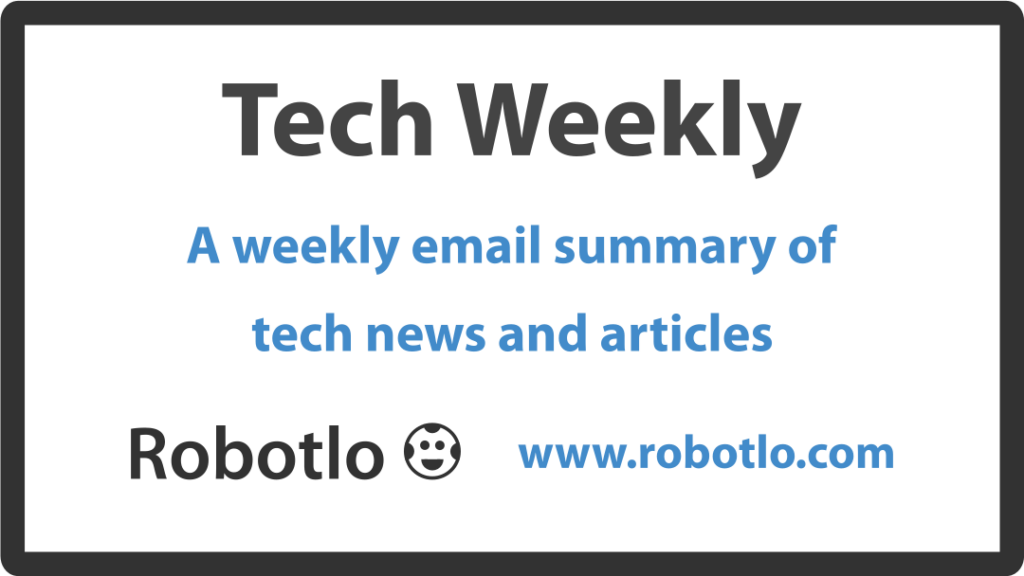
June, 2016
Robotlo
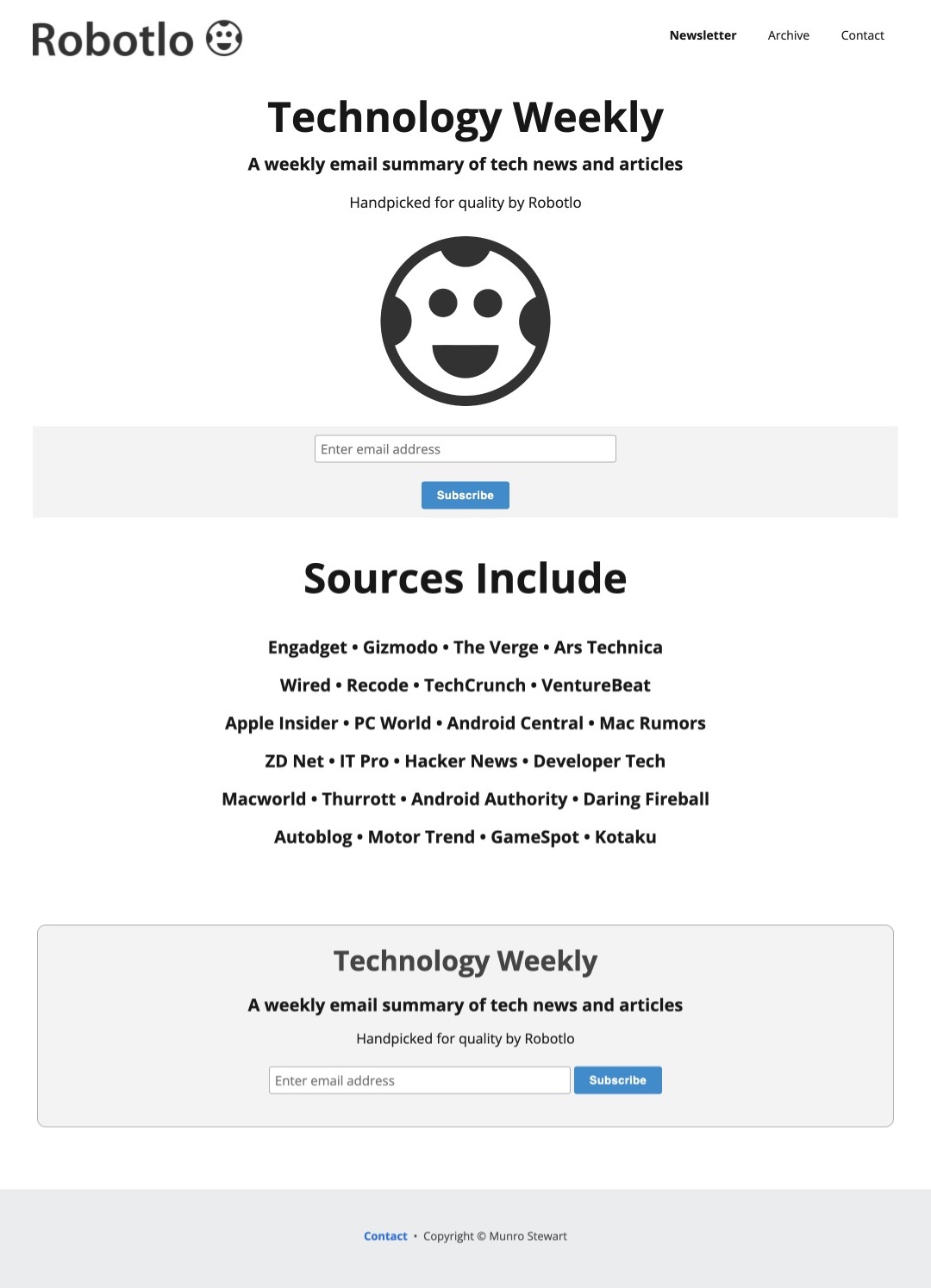
Post
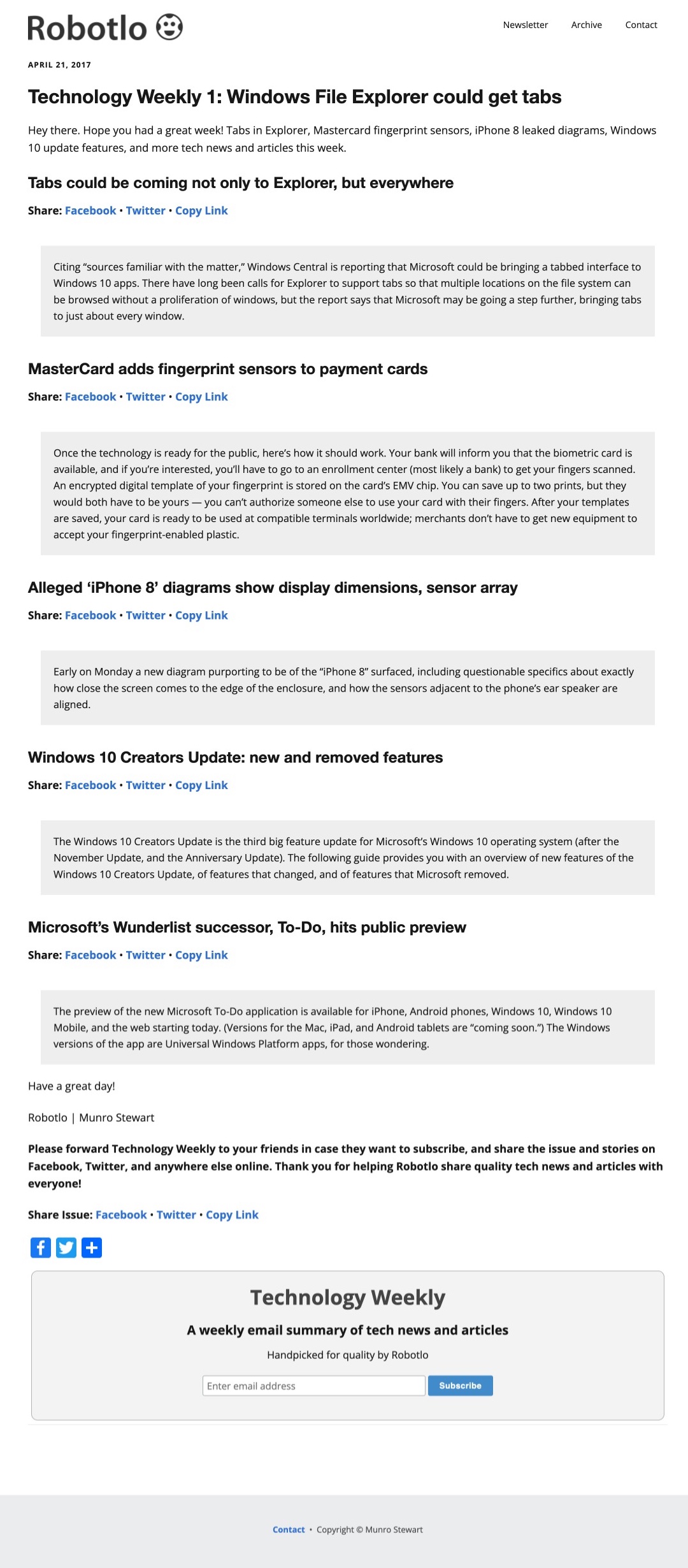
Contact

Leafpit Brand
Leafpit Logo

Leafpit Brand

Leafpit Guides

May, 2016
Leafpit
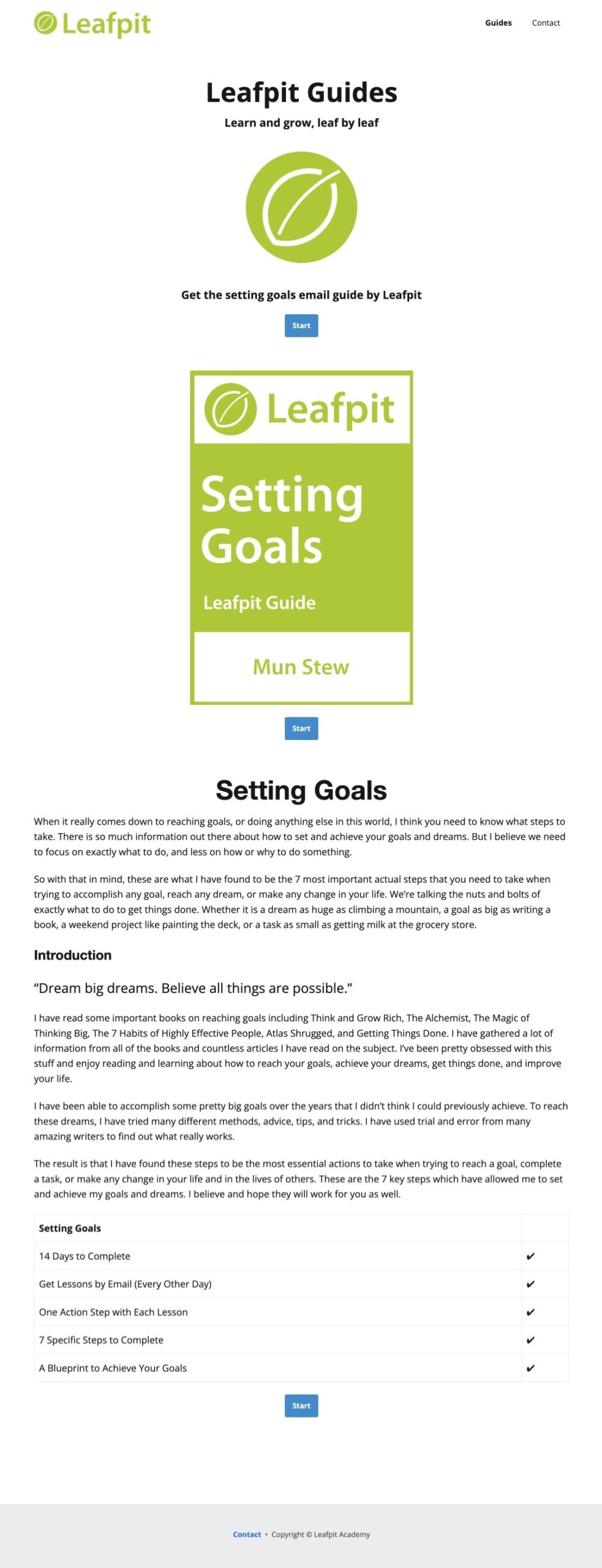
Brushium Brand
Brushium Logo

Brushium Brand

Brushium Review
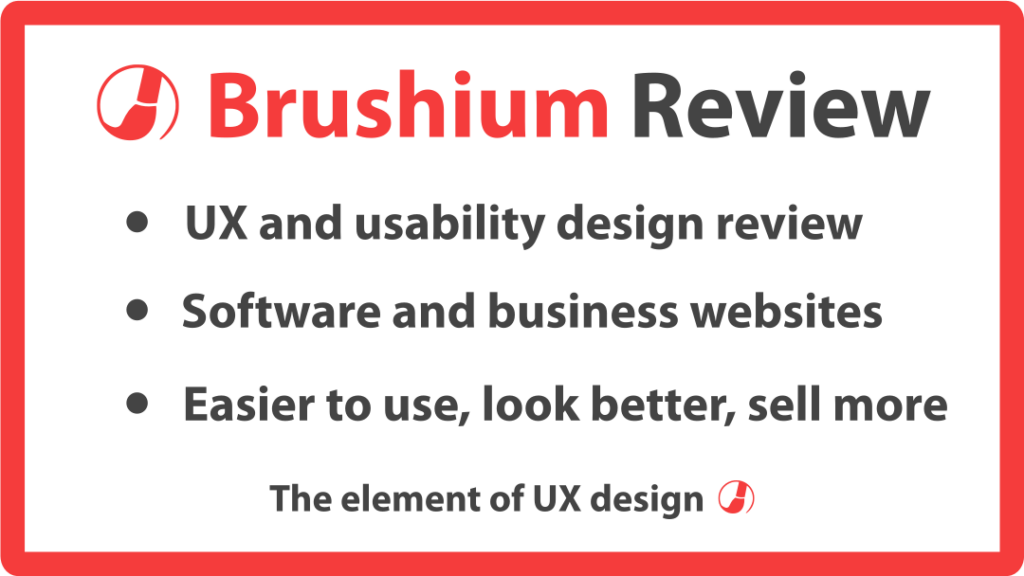
April, 2016
Brushium
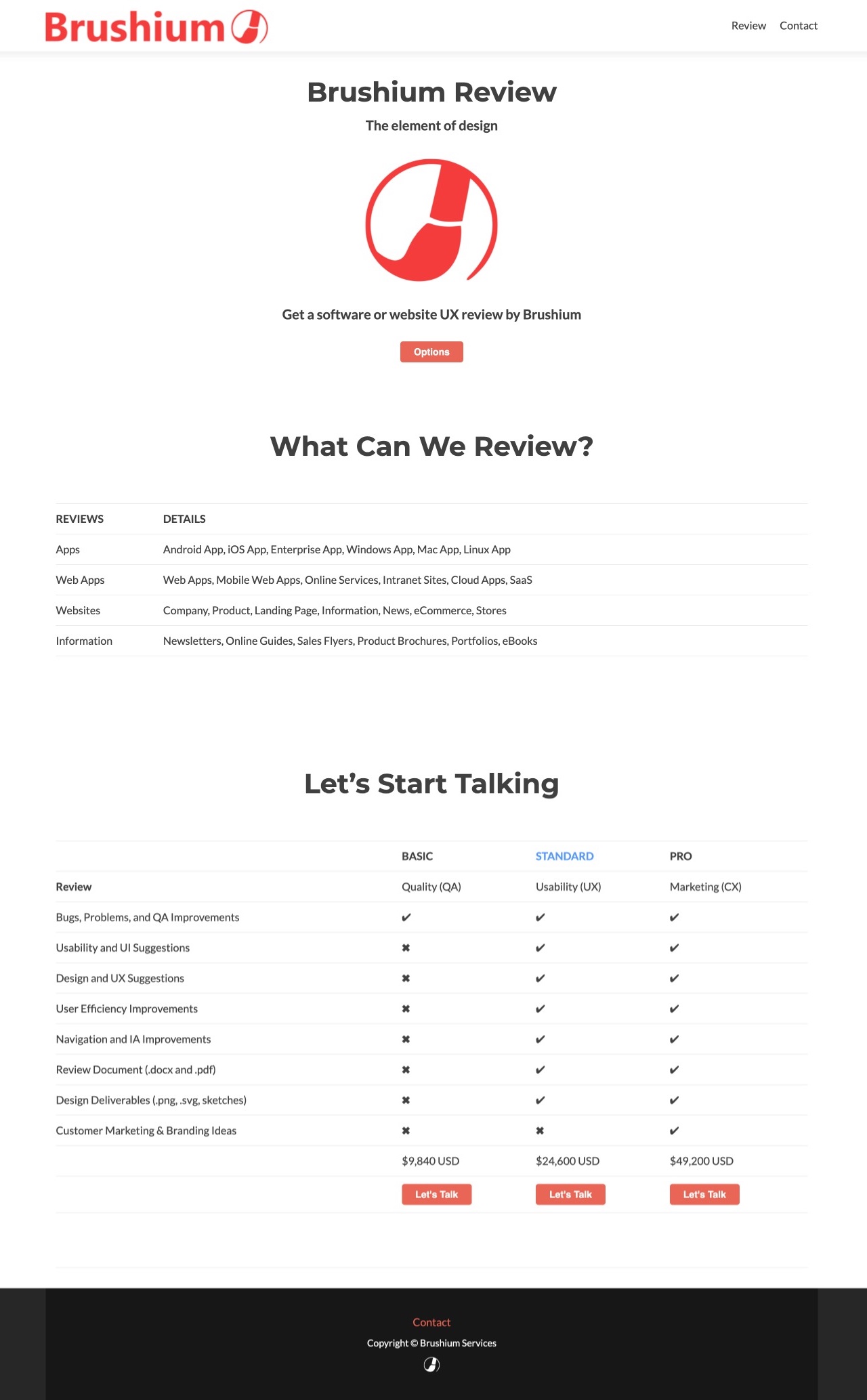
Contact
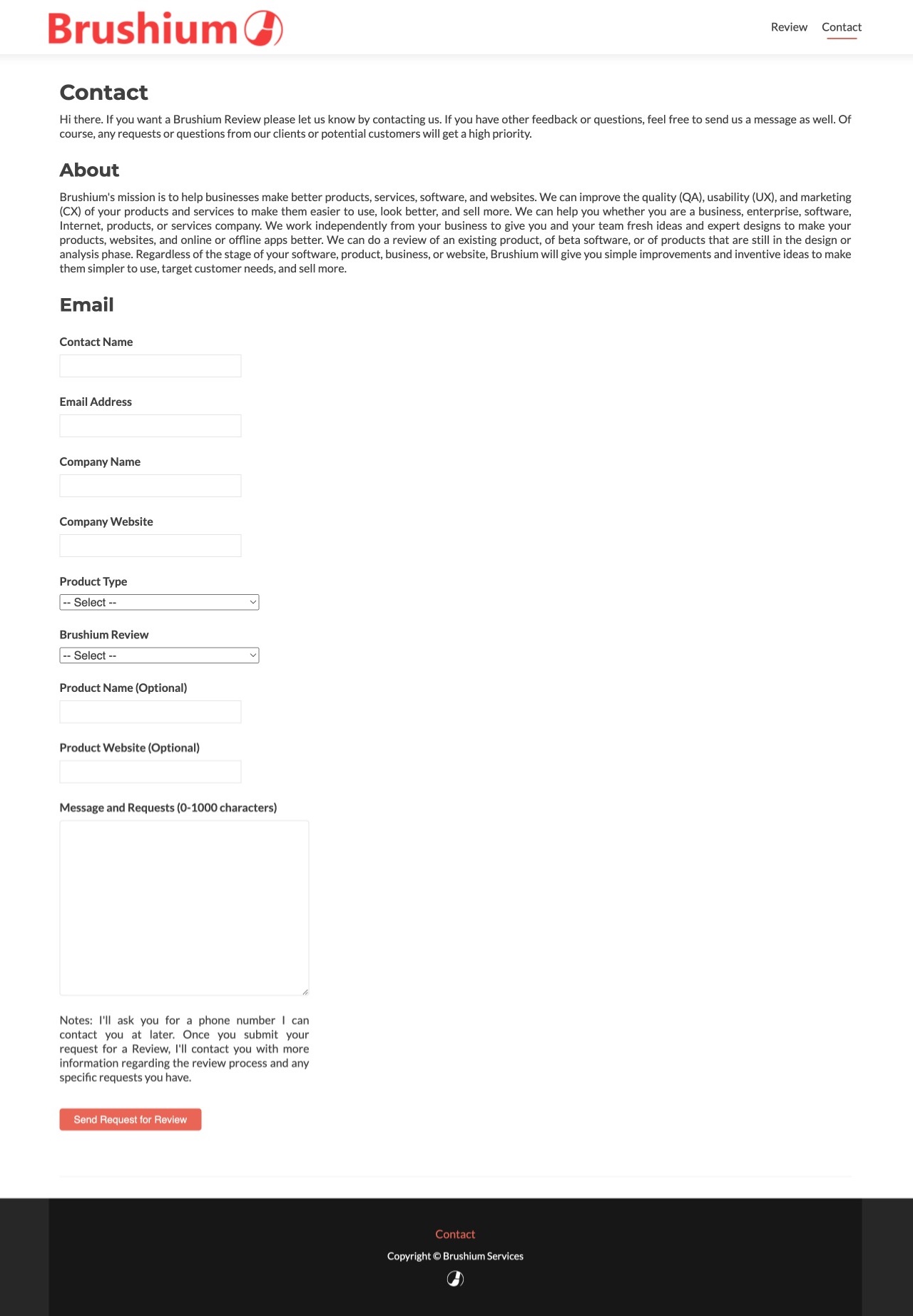
Ballite Brand
Ballite Logo

Ballite Brand

Ballite Website
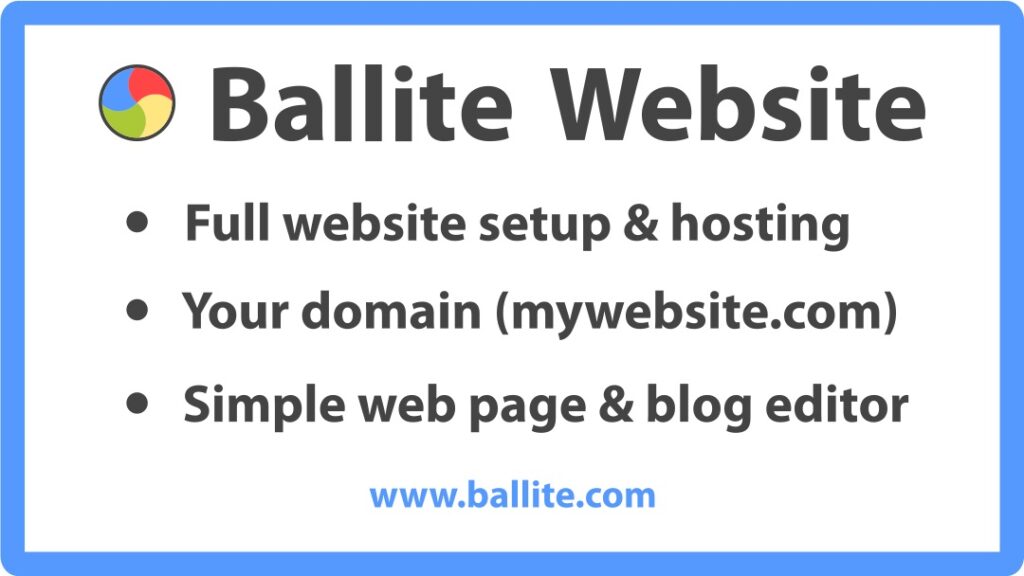
March, 2016
Ballite
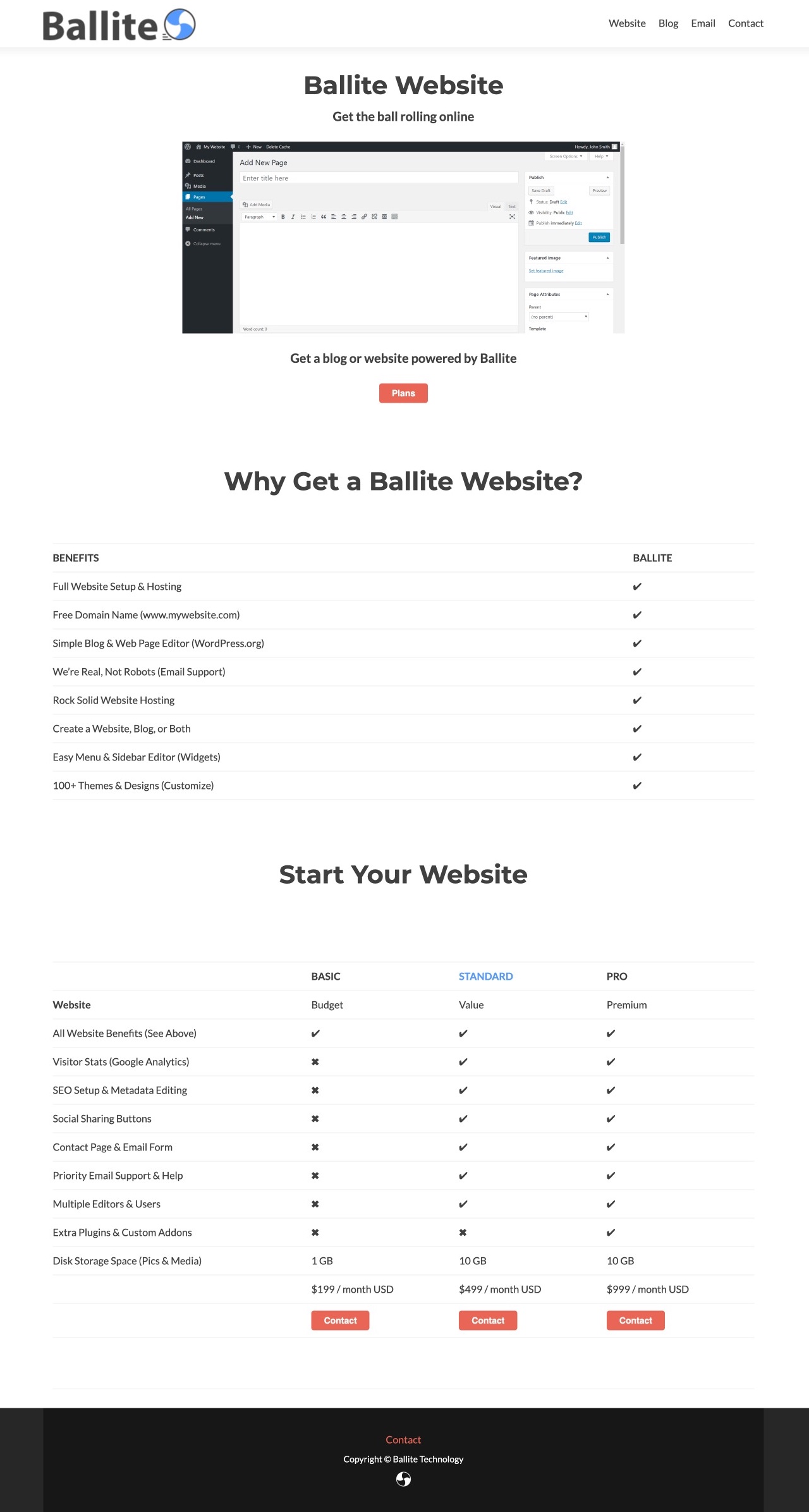
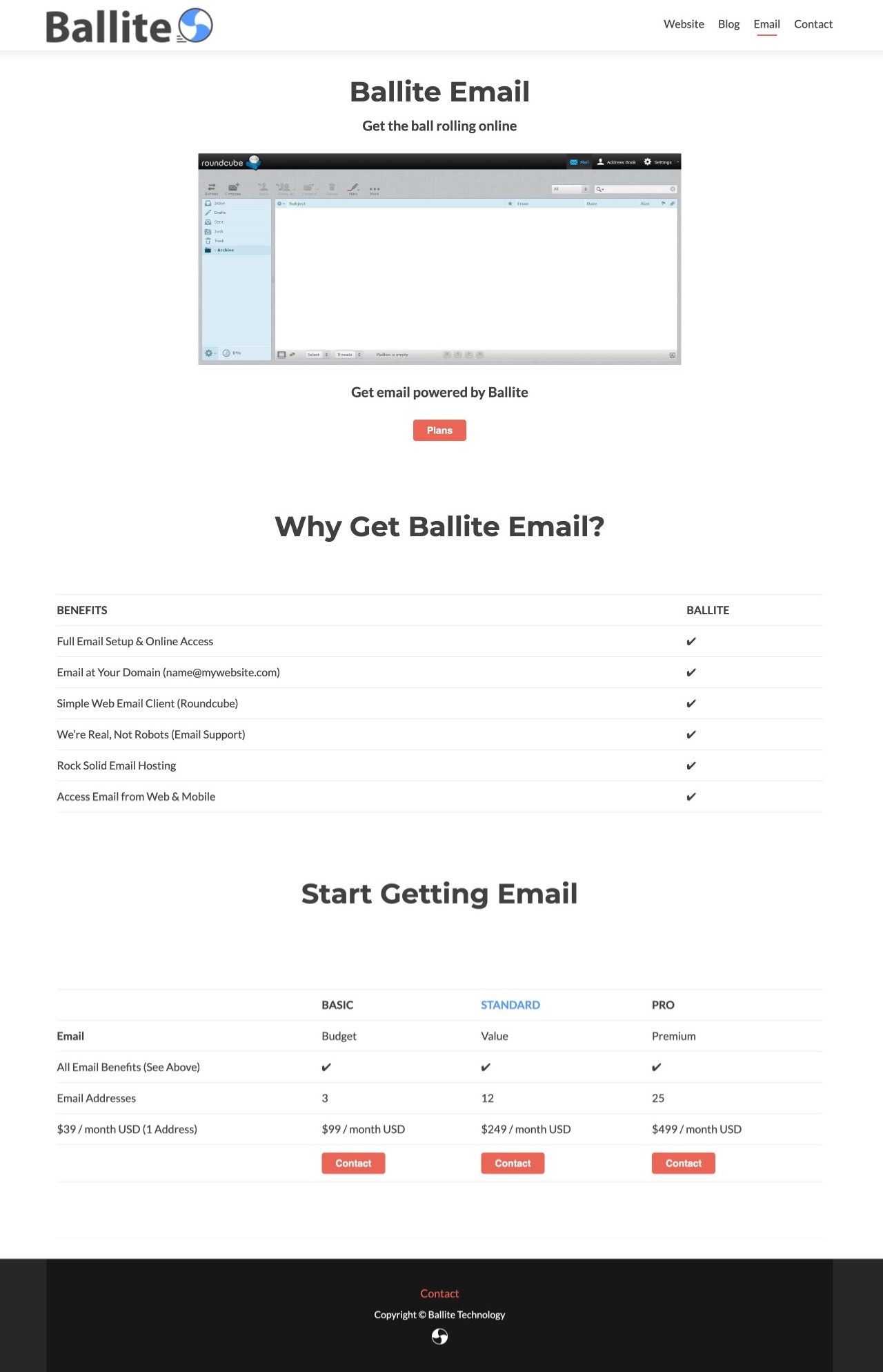
Contact
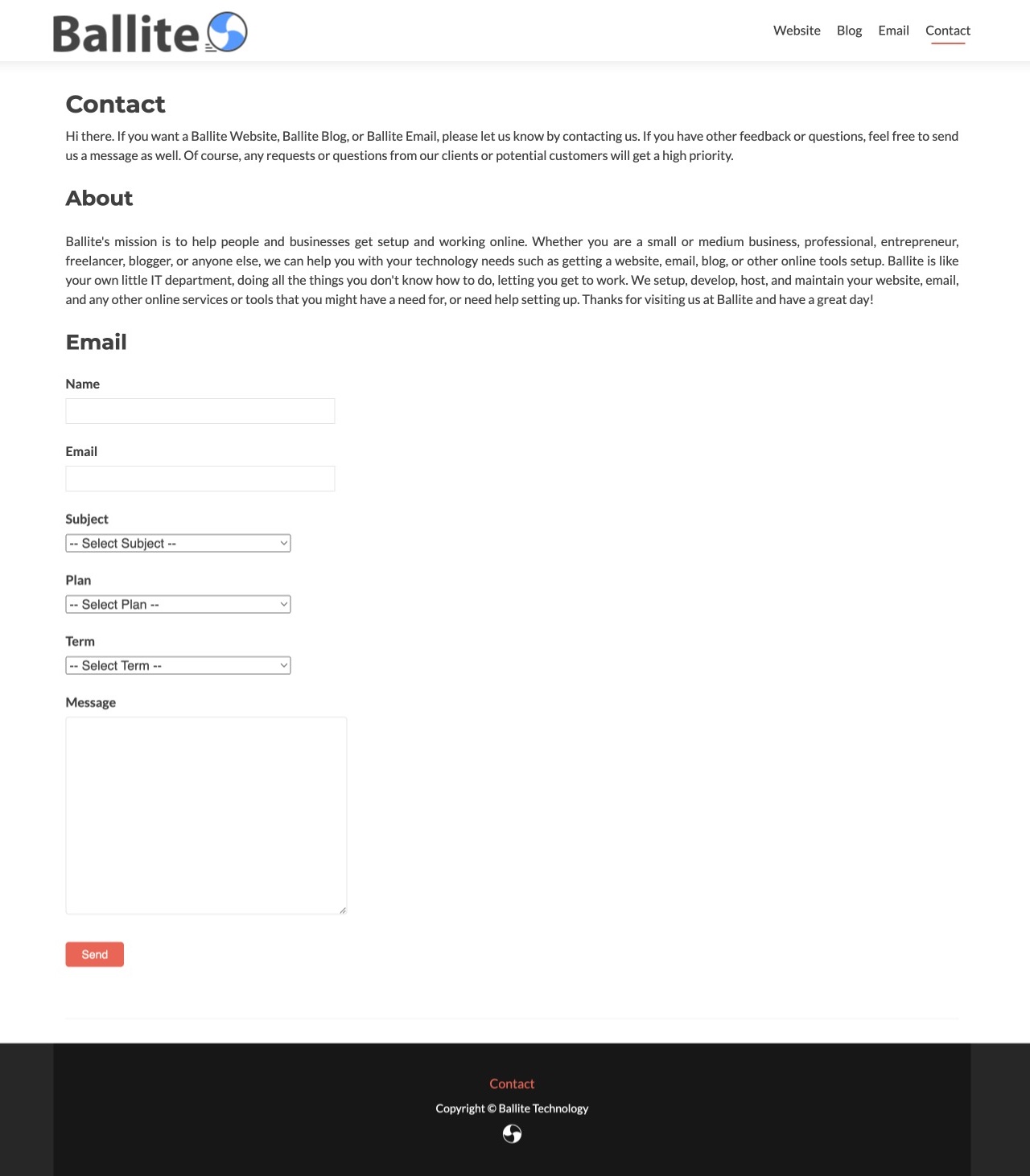
Thoughts On Making Swift Open Source
You've likely heard that Apple has made the Swift programming language open source. Of course, this means that developers could potentially be able to use Swift to make software on other platforms. That could eventually include Linux, Android, Windows, and web applications. I'm not completely sure of all the reasons why Apple has made this move. But here are a few ideas and thoughts.
Popularity Means More OS X And iOS Developers
Likely, Apple would simply like Swift to become more popular. If Swift becomes so popular that it is used for other platforms, then developers who have learned Swift might be more likely to build native apps for OS X and iOS at some point.
I believe Swift's first and foremost role at Apple will continue to be building native OS X and iOS apps, likely using Apple's XCode development environment. And Apple's main goal is still likely to get developers making native apps for their devices and computers. But anyone who learns Swift will likely think of building an app for OS X or iOS at some point, even if they first used Swift to build an app on Android or another platform.
Free Means Anyone Can Learn It, Including Students
Students are basically the developers of the future. By making Swift open source, it gives Swift a chance to be used as the basis for University or College classes. And if schools are teaching Swift, then businesses might want to make software using Swift because they have a bunch of young developers who already know the language.
At the same time, it makes it so that anyone, young or old, can use and learn Swift for free. While open source and free aren't the same things, it does essentially mean that anyone can learn Swift pretty easily now. They won't even need to get a Mac to learn Swift. But I think Apple still hopes that eventually they will get or use a Mac, whether it's at home or at work. That's because Swift will still be best used to build native apps on Mac and iOS.
Enterprise Is Where The Big Money Is
Apple at one point was largely targeting creative professionals with their Mac computers. But it seems they are trying to work their way into the enterprise more and more these days. They worked a deal with IBM to create iOS apps. And I wonder if open sourcing Swift could lead to many more enterprise customers for Apple as well.
While a large amount of enterprise software is shifting to the cloud, it doesn't mean that businesses don't still use or build software that isn't only web-based. Client-server applications are still used by most big businesses. It also doesn't mean that businesses won't ever find reasons in the future to make some software for a specific platform.
If Apple can figure out a way to get more enterprises to build custom software for Macs, they have a whole whack of money to gain. We're talking about huge businesses deciding to make custom client-server software on Macs, and outfitting their whole company with iMacs. Companies like Oracle, Microsoft, IBM, and HP are making all this money now. I don't think Apple is a big player in the enterprise space, but it doesn't mean they never will be. Maybe the announcement of Swift being open source could help Apple work their way into the enterprise.
Getting Help And Building A Community
Making a programming language and framework to build applications is not easy. When you make something open source, you basically gain a whole bunch of people who will help you build something without having to pay them. You also gain a community, hopefully making people feel like they are helping to build something together.
I think it's worth noting that making something open source and building a community around it hasn't been something Apple has done a lot of in the past. It will be interesting to see if they can do a good job with open sourcing Swift. I think Google and Microsoft have so much more experience in this area, and kind of make it look easy. Apple could go through a big learning curve with this approach, similar to their troubles with making cloud software. You know, things like MobileMe, iCloud, and Apple Maps. Being open like this certainly hasn't been Apple's strong point either. So we'll see how well they are able to pull this idea off.
It Worked For Android And WordPress
Google chose to use Java for Android, likely for many of the reasons above. Java was extremely popular both at schools and at enterprises. It was being used by students to learn programming, and enterprise developers were using it to build huge client-server applications, and also large business web applications and websites. Because so many developers already knew Java, it was easier for them to try making an Android app.
Similarly, PHP is being used for creating a large amount of the smaller websites and blogs on the internet. WordPress became extremely popular, largely because it is built using PHP, an open source programming language. And because WordPress itself is open source. Microsoft and Oracle could get big enterprises to use their programming tools and languages, but ended up losing a lot of customers because hosting a WordPress website is so much cheaper.
Apple is kind of following in Android's and WordPress' footsteps with this move. They want Swift to get more popular. And to do that, it needs to be free to use, and available to learn on platforms other than Macs.
Brushium Icon



January, 2016
Firefox For iOS Released To App Store
I guess Mozilla just couldn't wait until iOS was 10 years old. The Firefox web browser has finally been officially released for iOS, eight and a half years after iOS was first introduced with the first iPhone.
Syncing Bookmarks To Mobile Is (And Was) Important
In my mind, the release of Firefox for iOS is important for one main reason. We now have the ability to sync bookmarks to Firefox on iOS. For the majority of people out there, that is all that really matters.
You can count me as one of those people. Like many other people I'm sure, I used Firefox as my main browser for quite a number of years. When I bought my first iOS device, a 2G iPod Touch, I had to figure out which browser to use. For quite a while I still used Firefox on the desktop. My journey took me to drop Firefox on my desktop for Safari, then to Mercury which used Firefox Sync, then back to Safari, and finally to Chrome.
The only real reason I switched was because I couldn't easily sync my bookmarks in a fully supported way with an iOS Firefox app. I really think that Mozilla unfortunately underestimated this impact and lost a boatload of dedicated users simply by not having an iOS app that synced bookmarks. While it might have mattered to Mozilla, it wouldn't have mattered much to users if it was a little slow or didn't use its own rendering engine. And a large majority of those people who switched to sync their bookmarks to their desktop aren't going to go back to Firefox now because they already switched.
The Competition Is Tougher Than It Was In 2005
You think that in, say 2005, that it was tough for Mozilla to compete with Microsoft's built-in IE browser? Yes, it was extremely difficult since IE was installed by default and Microsoft was a behemoth of a software company. Firefox slowly gained more and more users as more and more people became more knowledgable about computers. Some of those people looked into using a different browser.
But how about the competition now. Google has a crazy amount of money and the most dominant mobile platform with Android. Apple has a ridiculous amount of money too, and anyone with a Mac will simply use Safari. Not to mention Microsoft has recently released Windows 10, which has a built-in browser that is much improved, with Edge. If you follow my logic though, Mozilla actually has a leg up on Microsoft now, since Edge isn't yet available on Android and iOS mobile platforms yet. So you can't sync your bookmarks, er I mean favorites.
But however you look at it, it's only going to be tougher for Mozilla to gain back users that it lost by not having Firefox and bookmarks syncing available on iOS. Google and Apple are both as big as Microsoft now, and all three of those companies put a large amount of effort and resources into building their web browser. But at least going forward Mozilla can now promote Firefox being available on iOS, which will interest some people into giving it a shot on their laptop or desktop again too.
Firefox Web Browser For iOS Features
Here are some of the features highlighted by Mozilla on the Firefox for iOS App Store page.
Experience a fast, smart and personal Web. Firefox is the independent, people-first browser made by Mozilla, voted one of the Most Trusted Internet Companies for Privacy. Upgrade today and join hundreds of millions who depend on Firefox for a more personal browsing experience.
FAST. SMART. YOURS. Firefox is made with you in mind and gives you the power to take back control of your Web experience. That’s why we design the product with smart features that take the guesswork out of browsing.
SEARCH INTELLIGENTLY & GET THERE FASTER
- Firefox anticipates your needs and intuitively provides multiple suggested and previously searched results across your favorite search engines - every time.
- Easily access shortcuts to search providersBROWSE PRIVATELY
- Your personal information belongs to you. In Private Browsing mode, Firefox won’t remember any of your history or cookies, but new bookmarks will be saved.
- Delete your browsing history, passwords and more in a single tap.
- Choose the private data you want to remove.
- **iOS 9 required for Private Browsing mode**SYNC FIREFOX ACROSS YOUR DEVICES
- With a Firefox Account, access your history, bookmarks and open tabs from your desktop on your smartphone and tablet.
- Firefox can also remember your passwords across devices so you don’t have to.INTUITIVE VISUAL TABS
- Intuitive visual and numbered tabs easily let you find content for future reference.
- Open as many tabs as you like without losing track of your open Web pages.EASY ACCESS TO YOUR TOP SITES
- Spend your time reading your favorites sites instead of looking for them.
Thoughts On Merging Android And Chrome OS
We may have Android PCs and laptops by 2017, which could compete more directly with Windows and Mac computers. This has been rumored before, but this time it comes from the Wall Street Journal, a pretty reliable source.
Android PCs Make Sense
It makes complete sense to me that Google will eventually make "Android for PC". Android is an extremely popular mobile OS, so a lot of those apps could also run on a desktop OS. Google has been making an Android OS for pretty much every other platform over the last couple of years, except for the desktop. This includes their decision to make Android Auto, Android Wear, and Android TV. And thirdly, even though Google has focused on the cloud for desktop, there are still limitations to a desktop operating system like Chrome OS which doesn't support native applications.
Native Apps And Games Have Advantages
It's great to run software in the cloud so it is cross-platform. But there are still cases where native apps work better, and we can have the best of both worlds. Games is one of those categories. Google could make a large amount of money just from Android for PC games. Also any applications which could benefit from locally saved data will also work better with a native desktop OS. This includes productivity apps and even apps for photos and music.
I know browsers continue to get better with saving data locally, but just being able to have your own files on your computer is still better in many cases. Or to be able to install Dropbox for your Android PC if you use Dropbox instead of Google Drive. While most software is also moving online as well, there are still many people who will buy a Windows 10 computer instead of one with Chrome OS, just because they like having their files offline on their computer as well.
It's All About The Taskbar
I'm completely oversimplifying here, but as a very simple implementation, Google could almost just add a taskbar at the bottom for Android for PCs. I'm not saying that is all they will do or should do. They want to do something similar to Microsoft where an app can be created for all platforms, but the UI looks different on the desktop than it does on mobile. But I'm just saying that to me the biggest difference is just that taskbar at the bottom. That is why I thought Windows 8 didn't work without a taskbar, and why I believe Microsoft made the correct decision with Windows 10 to bring Windows Store apps into windows on the desktop.
Google's Single Android OS Advantage
One advantage that I believe Google has over Microsoft and Apple, is that they don't have to support legacy applications. While mobile Android apps are not designed for a large screen, at least they would run on a version of Android for PCs. It's not like the difference Microsoft has between the Windows 8 and later Store apps, and original Windows desktop "programs". Google does need to support Chrome OS apps, but that is kind of given. They are supporting them on every desktop OS, through Chrome. It's not like trying to merge iOS and Mac OS X for instance.
Could E205SA Replace The ASUS X205TA Laptop?
Could this hidden "ASUS E205SA" reveal an upcoming Windows 10 laptop to replace the excellent 11.6" ASUS eeeBook X205TA notebook?
While reading about Windows 10 budget notebooks I came across this interesting tidbit. It's a reference to an "ASUS E205SA", which has not been announced or mentioned anywhere by ASUS. I wonder if it could be the possible replacement for the 11.6" eeeBook X205TA, which was one of the best reviewed budget laptops with Windows, and a bit of a revival for ASUS of their old eeeBook netbooks. Here's what I found out, along with an overview of a number of cheap budget laptops that ASUS could release later this year with Windows 10.
Earlier this summer, it looks like ASUS announced or released information for three different lines of Windows 10 notebooks in the E series, some of which were previously known as eeeBooks. They have product pages for each of these laptops, with features and specifications.
However, I don't believe any of these have been released yet and their product specs could even change possibly. For instance, the 14" E402MA is listed with Windows 8.1, but I would guess it will come with Windows 10 when released. These laptops will most likely all be released later this year, as a whole line of new budget Windows 10 laptops from ASUS.
ASUS E402MA Regular 14"
There is the 14" ASUS E402MA, which is a 14" laptop with a 500 GB or larger hard drive. It looks like it will come in various colors. Because of the mechanical hard drive it won't be super thin or light. Battery life isn't mentioned but it likely won't be as great as the 11.6" eeeBook X205TA if it does come with only a mechanical hard drive.
ASUS E403SA Thin And Light 14"
There is the 14" ASUS E403SA, which is a 14" laptop with a 32-64 GB eMMC drive. It touts features such as a brushed aluminum finish, thin and light profile, and super long 14 hour battery life. Other than the brushed aluminum finish and 14" display, these specifications are more similar to the old 11.6" eeeBook X205TA.
It's a pretty interesting and good-looking device if you ask me. There's a good chance that it could end up being the best budget notebook with Windows 10. That is, if you are fine with a laptop that is more like a netbook or Chromebook, with only 32-64GB of flash eMMC storage. It has a battery life listed as 14 hours, and should be very light for a 14" laptop.
ASUS E202SA Regular 11.6"
Then there is the 11.6" ASUS E202SA, which is an 11.6" laptop with a 500 GB or larger hard drive. Like the 14" E402MA, it looks like it will come in various colors. It touts a solid 8 hours of battery life. While this laptop will be the same size as the 11.6" eeeBook X205TA, it doesn't have the flash hard drive, super thin and light profile, and excellent 12 hour battery life that it was known for.
ASUS E205SA Thin And Light 11.6" - Possible eeeBook X205TA Update?
However, unless I'm missing something, there is currently no 11.6" laptop with a 32 GB or larger eMMC drive listed anywhere. It got me thinking and wondering if they would also have an 11.6" with a flash eMMC drive to replace the 11.6" eeeBook X205TA. I wondered if it might be named either E203SA or E205SA, based on the product names of the other laptops.
Some quick detective work (yep, a Google Search) brought up an ASUS Web Storage excel file which contains a product named E205SA. It's also interesting that it is one of the few notebooks, along with the 14" E403SA above, to come with 500 GB of ASUS Web Storage as opposed to just 16-32 GB. This is likely because they will be touted as "cloudbooks" with only 32-64 GB of flash eMMC. So you get a large 500 GB of online storage from ASUS free for 2 years.
- Eee PC • ASUS WebStorage (ASUS • Google Translated web page)
- Product Information • ASUS WebStorage.xls (ASUS • English excel file)
What Features Could This New 11.6" ASUS E205SA Have?
So I think it's possible that the reference to an E205SA could mean that it is the actual successor of the 11.6" eeeBook X205TA. If that's the case, then this potential 11.6" E205SA could have similar features and specs as the already announced 14" ASUS E403SA, but be packaged with a 11.6" display.
The 14" ASUS E403SA and 11.6" ASUS E205SA could be very similar to the old 11.6" eeeBook X205TA in that they should be very thin, light, fanless, and have exceptional battery life. They should be cloudbooks and only come with 32-64 GB of eMMC flash storage, and of course come with Windows 10. And they should also be updated with a nice brushed aluminum finish version.
What Features Could All These New ASUS Laptops Have?
All 4 of these product lines could have Braswell processors, a USB Type-C port, and 802.11ac Wifi as a few of their main upgrades. Another interesting new feature could be what ASUS marketing is calling IceCool, which they say is an internal layout that keeps heat away from the palm rest of these laptops so your palms stay cool even when you use it for hours on end.
I do wonder if it's also possible that the colorful 14" ASUS E402MA and 11.6" ASUS E202SA might come in versions with 32-64GB flash drives instead of a 500GB-1TB mechanical hard drive. And maybe the brushed aluminum 14" ASUS E403SA and potential 11.6" E205SA might also come in different colors than just the brushed aluminum finish, either at launch or later.
Best Budget Windows 10 Laptops? (Plus The Competition)
So what does all this mean? Well, put simply, I think that the 14" ASUS E403SA and this uncovered 11.6" ASUS E205SA with flash storage have the potential to be the best budget Windows 10 laptops. Or more specifically, the best alternative to Chromebooks with flash storage and a super thin and light design. And the 14" ASUS E402MA and 11.6" ASUS E202SA could be the best budget Windows 10 laptops if you want a more traditional small laptop with some real hard drive space. Plus you'll hopefully be able to replace the hard drive with a real SSD if you want to on those laptops.
ASUS has a pretty great track record, and it looks to me like these new laptops might be a better option than the previously released 11.6" and 14" Acer Aspire One Cloudbook, and the soon to be released 2015 update to the HP Stream 11 and 13.
The 14" version of the Acer One Cloudbook sounds like a great device as reviews say it has a great 12+ hour battery life and great keyboard for a budget device. While the new version of the HP Stream hasn't been released or reviewed yet, it sounds like the 11" version of the Stream could be the better option since it has an improved 10.5 hour battery life and display. And the previous versions of the 11" Stream was known to have one of the best keyboards for a small netbook-like laptop.
But my spidey senses tell me that once these ASUS laptops come out, they will be reviewed extremely well, just like the old 11.6" ASUS eeeBook X205TA. So if you are looking to buy a good cheap Windows 10 laptop, you might want to wait until ASUS releases their budget Windows 10 lineup.
Conclusion - Potential ASUS Windows 10 Budget Lineup
So if my sleuthing is correct, the E205SA could be the real successor to the 11.6" eeeBook X205TA with flash storage. If not, this article should still have given you a good overview of the unreleased budget Windows 10 laptops that should be upcoming from ASUS. Here's a quick overview of what their Windows 10 budget lineup could look like, including the unannounced "ASUS E205SA", which could be the eeeBook X205TA replacement.
- 11.6" ASUS E205SA - 32-64GB flash eMMC
- 14" ASUS E403SA - 32-64GB flash eMMC
- 11.6" ASUS E202SA - 500GB-1TB drive
- 14" ASUS E402MA - 500GB-1TB drive
As far as pricing, the announcement of the 14" ASUS E403SA suggests it should come in a 32 GB and 2 GB RAM version for $299 USD. I wonder if the ASUS E205SA, the possible successor to the 11.6" eeeBook X205TA, might come in a 32GB and 2 GB RAM version for $199 or $249 USD, and a 64 GB and 4 GB RAM version for $299 or $349 USD.
If it did, the prices and storage specs for these laptops would be similar to the ASUS ZenFone 2 Android phone, which has been a pretty big hit for ASUS. And it could make them the best and cheapest budget Windows 10 "cloudbook" laptops that offer 64 GB and 4 GB RAM.
Why Apple Watch Sales Could Be Underwhelming
Since the Apple Watch launched, it hasn't sold quite as well as some people thought it might. Here's my quick take on the key reasons why the sales for the Apple Watch might be lower than expected. From what I've read it sounds like it hasn't been as big of an initial success as the iPod, iPhone, or iPad. I wonder if the low sales could be boiled down to just one or two reasons, even though reviews focus on so many technical specifications and cool features.
The Apple Watch Is Simply Too Expensive
Like any tech product or gadget, the Apple Watch has been reviewed and analyzed excessively and in-depth. Every review has a different opinion about what features should make you want to get yourself an Apple Watch. Or conversely, reasons why it isn't worth buying or isn't selling well. Things like battery life or features that don't work perfectly.
And with a typical price of about $600 US, and a low price of $400 US, I think it is likely much too high of a price to reach any kind of mainstream adoption like we saw with the relatively low-priced iPods, iPhone, iPod Touch and iPad.
But often in the end, I think the large majority of regular consumers focus on price first. And the price of the Apple Watch might simply be too high over competing products, even in its lowest price version. So it might not matter that much if you need an iPhone to use all of the Apple Watch features, or how great the interface is, or even that the battery might not last long enough. While Apple can get people to pay a certain premium for their products, they also may need the price to be in the same vicinity of the products it is replacing or competing with.
And with a typical price of about $600 US, and a low price of $400 US, I think it is likely much too high of a price to reach any kind of mainstream adoption like we saw with the relatively low-priced iPods, iPhone, iPod Touch and iPad. While the smaller size is $50 less, it doesn't actually hit a significantly lower price point. Which leads me to the other reason why I think the sales of the Apple Watch haven't been as great as previous products.
Too Much User Choice With Too Many Bands And "SKUs"
I think Apple may also be trying to sell too many different Apple Watches, with way too many different bands. And I think that even the two different sizes might have been a bad choice for the first release, and maybe even at all. Apple has had success in the past with simplifying not only the amount of products they have, but also limiting the amount of options you can choose from for a single product. This decreases the chance that people will look elsewhere because of choice overload. But it seems to me that Apple is getting further and further away from focusing on simplifying their products and product lines.
One example of Apple not focusing their product choice is looking at all the different versions of iPads and iPad Minis they have had for sale at the same time somewhat recently. In the past, they would come out with a new version of a product, and the old version would simply be dropped, having been discounted in the months leading up to the new release. Then with the iPhone they started keeping around a previous generation at a lower specific price point.
But however you look at it, it's far more options than a single size iPad where all you had to choose was how many GB of space you want and if you were getting the WiFi or cellular version.
But now there is a dizzying amount of different iPads and iPad Minis, all with different storage amounts and wireless connection options. You got your iPad Air, iPad Air 2, iPad Mini, Mini 2 with retina display, and Mini 3. All with different options and so many different prices. Too many options I think, and they are not differentiated enough to help the consumer know exactly what you should buy with how much money you want to spend.
And now, with just the first release of the Apple Watch with its two different sizes and all kinds of different bands, Apple seems happy to continue the trend of offering lots and lots of choices. They even advertise their large amount of choices above all else on their website. Right at the top the Apple Watch highlights that it is "Available in 20 models", the Watch Sport is "Available in 10 models, and the Watch Edition is "Available in 8 models". That's got to be something like 50 different models. OK, hopefully your math is better than that.
But however you look at it, it's far more options than a single size iPad where all you had to choose was how many GB of space you want and if you were getting the WiFi or cellular version. With each set of options segmented into clear and distinct price points. Making those decisions wasn't hard for the consumer as they knew exactly what they were or weren't getting.
Could It Really Be This Simple?
So I'm guessing some of you will read this and say "Well yeah. Of course." I hope that's the case, as then I'm probably onto something if most people agree. But many of the reviews don't seem to mention the price or the fact that there are so many different options and price points to choose from. Yet they go into amazing depth with different features.
What I'm saying is that we have so many exhaustive reviews about features, and specifications, and cool things the Apple Watch can do. And I have read different reviews suggesting those are the reasons why people don't need or won't get an Apple Watch. But when it really comes down to it, I think there are more obvious and much more important deciding factors. While there are many factors, I think three key ones in this case include price, user choice, and desirability.
Unlike the original release of the iPad, the price point of the Apple Watch is just too high compared to competing products. And there are too many options at different price points, which doesn't give the buyer a clear idea of what they are getting and why.
Desirability we know Apple is awesome at. While I'm not the best one to evaluate how the marketing for the Apple Watch has gone and how well they did to influence people's desire for the product, I think it's safe to assume it was done extremely well. That is what Apple has always been good at as far as I can tell. Part of its success has been their marketing and ability to get you to really want and desire something. They packed a lot of cool new features into the Apple Watch and have most likely done an amazing job marketing them and selling the Apple Watch.
I think it is likely just those other two factors that are stopping large numbers of people from buying an Apple Watch. Not really what specific features it has. Unlike the original release of the iPad, the price point of the Apple Watch is just too high compared to competing products. And there are too many options at different price points, which doesn't give the buyer a clear idea of what they are getting and why.
A number of years ago Apple had seemed to focus so much more on reducing and simplifying both the options and price points for their products. And I don't think they have done that as well with the Apple Watch. So I really do think the possible low sales is as simple as that; the price is too high and there are too many options.
Conclusion
So I just don't think Apple has been able to hit the right price points for the Apple Watch. And they have made the buying decision too complicated with too many choices. I think those are the real deciding factors that stop people from buying the first release of the Apple Watch.
Apple had been simplifying the amount of products and product versions it released in the past. But now with the release of the Apple Watch, they offer a dizzying amount of options, and advertise it as being a plus. They also had been hitting price points that were closer to mainstream adoption with new products like the iPod and iPad. But now with the Apple Watch, they have come out with a product that seems way too high above the price points it needs to be at.
I should mention I don't even have an Apple Watch. So I might not be the best person to have an opinion about this. However, I was considering buying one before it was announced, yet I didn't get one. Do you think you can guess one of the reasons why I didn't get one? Yes, you nailed it. I was hoping that a different font would be used for the UI. Either that, or I think that paying more than $299 for a watch might be a little excessive. Especially when you consider smart watches won't last nearly as long as analog or digital watches which people often payed a premium for. And I also feel like I might be missing out if I get the small version and the cheapest band. So a buyer starts off feeling like they might have made the wrong choice when they should be happy about their buying decision and their cool new gadget.
Links
Thoughts And Predictions For Rumored iPad Mini 4
One thing that I didn't see mentioned in the newest rumors about the next iPad Mini is how much it will weigh. I have a feeling that the new iPad Mini could have its weight reduced significantly, to somewhere around 250 grams or lower. Maybe anywhere from about 220 to 260 grams. Here's how I came up with that number, along with my thoughts about the potential release date.
I figured this out from looking at the weights of previous iPads and previous iPod Touches.
iPad Mini 4 Weight
When Apple released the iPad Air, the WiFi version went down from the 650 gram iPad 4th gen to just 450 grams. Apple also reduced the weight of the iPod Touch over two generations from the 115 gram 3rd generation to the 88 gram 5th generation. The drop in weight for each was around 70-75%.
And now it looks like the next iPad Mini should be much thinner and have the same thinner design that the iPad Air and iPod Touch 5g used. So I wonder if the iPad Mini will go down in weight to 70-75% of the 330 gram weight of the iPad Mini 3rd generation. So somewhere around 250 grams or lower.
It would be amazing if they figured a way to get the iPad Mini to be under 200 grams. That would be asking too much I think. But I wouldn't doubt if Apple has thought about 200 grams as a target weight for the Mini. However, for this release I think getting it to under 250 grams is a more realistic possibility.
iPad Mini 4 Release Date
And when will the iPad Mini 4 get released? Apple has an event scheduled for September 9th. Some of the products that have been in the rumor mill include the iPhone 6s, iPad Pro, Apple TV with new remote, iPad Mini with thinner design, and retina 21.5 inch iMac.
My guess is the September event will be about the iPhone and Apple TV, and the availability of iOS 9. While a second October or November event will highlight iPads. That would include the new iPad Pro, along with the new iPad Mini 4th generation.
The main reason for thinking the iPad Pro and iPad Mini will be launched in a separate October event is the fact that in both 2013 and 2014 they held a separate event. It was at that special event that iPads were announced. The iPad Air and Mini retina in 2013, and the iPad Air 2 and Mini 3 in 2014.
So it might make sense that they might stick with this schedule and announce the iPad Mini 4, alongside the new iPad Pro, in October or November of this year. It's worth noting that they also announced different laptop Macs and desktop Macs at each of the October events. So we might expect the new retina 21.5 inch iMac to be announced at the October event as well.
TextFile Brand
TextFile Logo

TextFile Brand
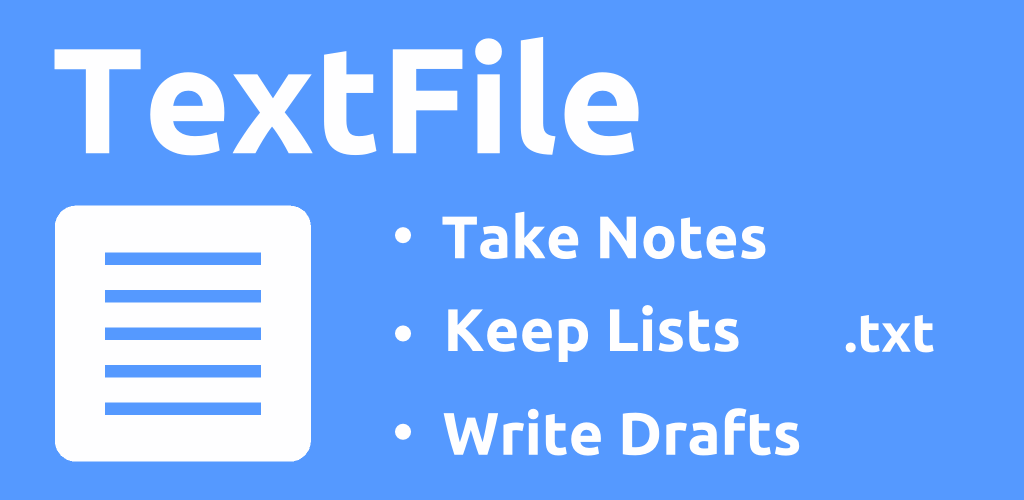
November, 2014
Text Editor Model
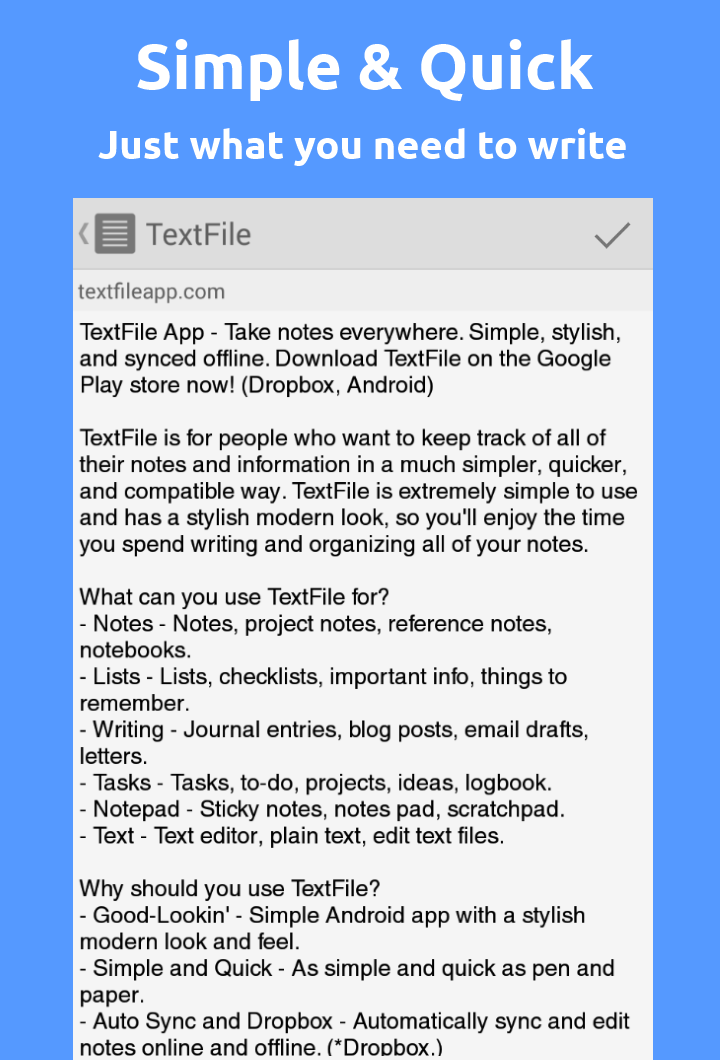
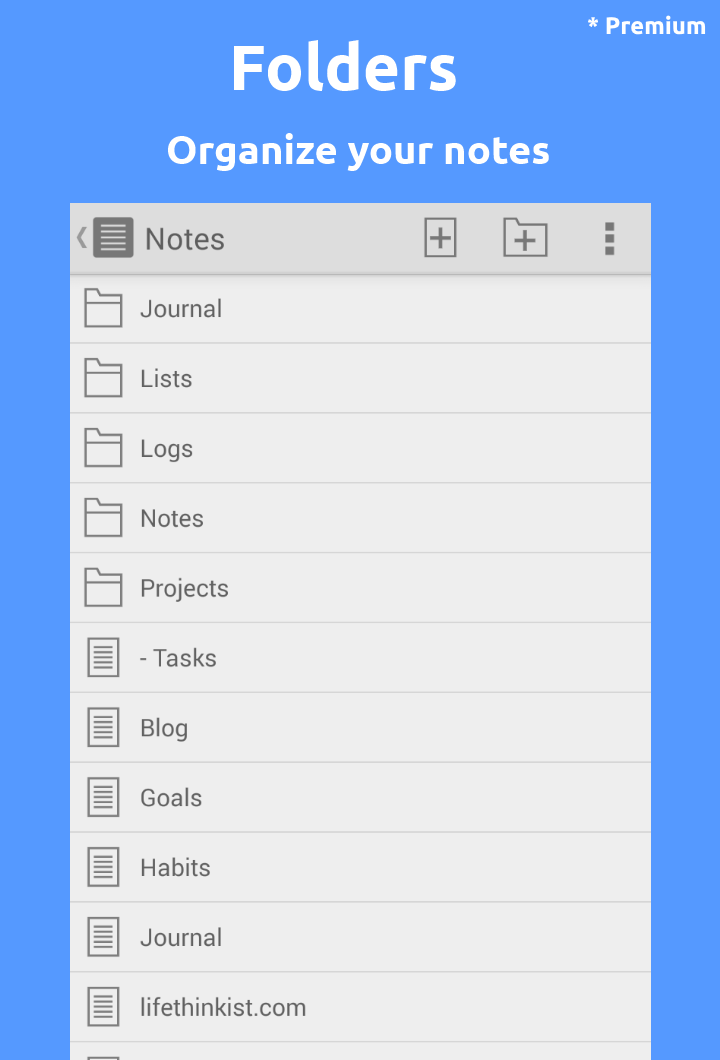
November, 2014
